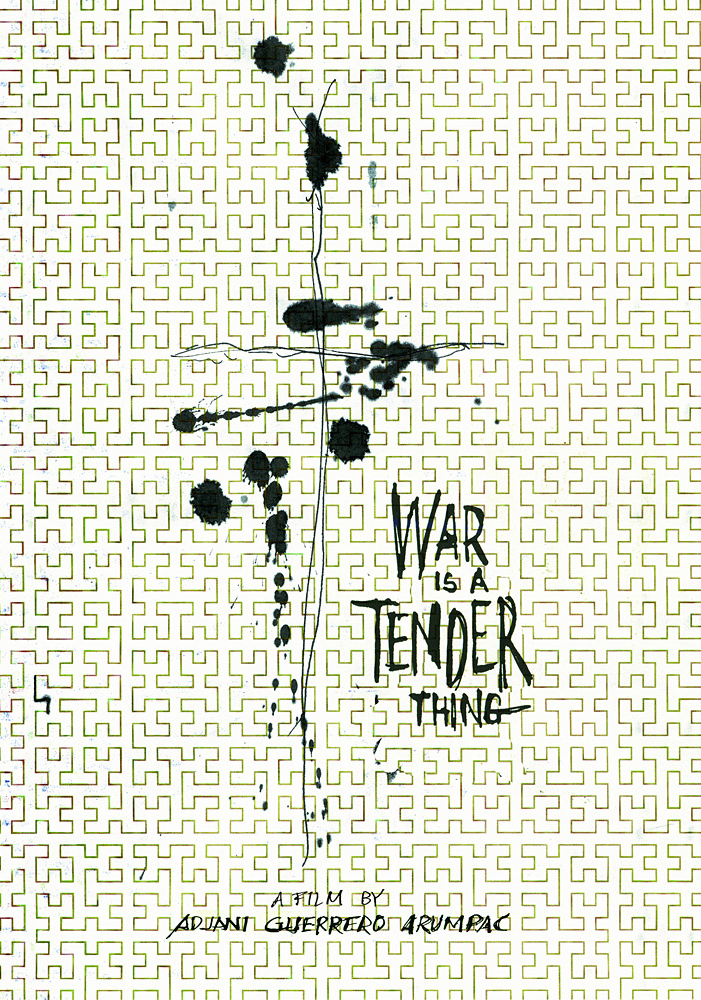Of Lives and Labels

Unter dem Titel “Of Lives and Labels“ thematisieren die Kuratorinnen Trinka Lat und Lola Abrera der Filmreihe „Nation als Problem: Von Zugehörigkeiten und Communities“ einen lang andauernden, blutigen Konflikt im Süden der Philippinen mit dem Dokumentarfilm War is a Tender Thing.
Mindandanao ist eine südliche Insel der Philippinen, sie ist Schauplatz eines der ältesten Konflikte Südostasiens. Jahrhundertelang widersetzten sich die Sultanate hier spanischen und späteren amerikanischen Kolonialherren. Trotz der Unabhängigkeit, die die Vereinigten Staaten 1946 den Philippinen gewährten, verschärften sich die Konflikte im Süden, was zur Bildung muslimischer Sezessionsgruppen in den 70er Jahren führte – in dieser Zeit galt auch das Kriegsrecht. Das wiederholte Scheitern der Friedensgespräche zwischen der Regierung und diesen Gruppen führte seitdem zu einem Kreislauf der Gewalt, der die Region geprägt hat. Die Filmemacherin Adjani Arumpac nähert sich diesem Krieg auf sehr persönliche Weise durch ihre eigene Familiengeschichte. Sie porträtiert den langen Konflikt als endlosen Versuch der Bürger auf den Südphilippinen, zu überleben und sich an die staatliche Politik anzupassen.
——-
Under the title „Of Lives and Labels“, the curators Trinka Lat and Lola Abrera of the film series The Nation is Problematic: (Re) Imagining Community and Belongingaddress a long-running, bloody conflict in the south of the Philippines with the documentary War is a Tender Thing.
Mindandanao is the scene of one of Southeast Asia’s oldest conflicts. For centuries, sultanates here resisted Spanish and later American colonial rulers. Despite independence granted by the United States to the Philippines in 1946, conflicts in the South intensified leading to the formation of Muslim secessionist groups in the 70s during Martial Law. Repeated failure of peace talks between the government and these groups since then resulted into a cycle of violence that has defined the region. The filmmaker Adjani Arumpac approaches this war in a very personal way through her own family history. She portrays the long conflict as an endless attempt by citizens in the Southern Philippines to survive and adapt to state policies.
Nation als Problem: Von Zugehörigkeiten und Communities
In Hamburg leben über 1.500 Filipina/o/xs. Mit dem Hafen stellt die Stadt unter anderem einen wichtigen Knotenpunkt für philippinische Seeleute dar, wovon einige nur kurz verweilen und andere sich niederlassen. Kuratiert von Lola Abrera und Trinka Lat, Gründerinnen von The First Reel, der Berliner Plattform für philippinische Kulturschaffende, stehen Filmproduktionen der philippinischen Diaspora und den Philippinen selbst im Mittelpunkt. Hinterfragt werden Vorstellungen nationaler Zugehörigkeit: Wer sind wir als Filipina/o/xs und als globale Bürger*innen? Womit identifizieren wir uns und was schätzen wir als Individuen? Wie gestalten wir die politischen, wirtschaftlichen und sozialen Realitäten für uns selbst und unsere Gemeinschaft? Wie verhandeln wir neue Zugehörigkeiten?
Von einem Film über Filipina/o/xs in Tel Aviv bis hin zu einer Performance von Dr. Anjeline de Dios bietet das Programm nicht nur Perspektiven auf die migrantische Erfahrung von Filipina/o/xs, sondern auch auf Fragen von Zugehörigkeit und Gemeinschaft der Diaspora in Europa allgemein.
Die Filme werden in Originalsprachen mit englischen Untertiteln gezeigt.
—
The Nation is Problematic: (Re) Imagining Community and Belonging
There are over 1,500 Filipina/o/xs living in the city. As a port city, Hamburg is also a critical hub for Filipina/o/xs seafarers who are either passing through or have eventually made Hamburg their home. As it is The First Reel’s mission to provide a unifying space for those bound by the various dimensions of their Filipina/o/x identity, the First Reel has teamed up with the Museum am Rothenbaum (MARKK) to showcase an array of critical films performances from October 2018 to March 2019.
With the theme „The Nation is Problematic: (Re) Imagining Community and Belonging“ the First Reel aims to explore and (re) imagine the different dimensions of identity and nationhood in the context of community and belonging. Examining the Filipina/o/x diaspora—and by extension, other migrant communities—prods us to further break down the concept of nationhood: Who are we as Filipina/o/xs participating as global citizens of the world? What do we identify with and what do we value as individuals? How do we shape the political, economic and social realities for ourselves? How do we align with our new communities?
From a film about Filipina/o/x migrants based in Tel-Aviv to a performance by Dr. Anjeline de Dios, the program will provide various perspectives on not only the Philippine migrant experience but also on a broader scale, the notions of community and belonging for those within various diasporas in Europe.
From a film about Filipina/o/x migrants based in Tel-Aviv to a performance by acclaimed Philippine activist-historian Carlos Celdran, the program will provide various perspectives on not only the Philippine migrant experience but also on a broader scale, the notions of community and belonging for those within various diasporas in Europe.
In Kooperation mit The First Reel.
Gefördert im Programm 360° – Fonds für Kulturen der neuen Stadtgesellschaft der Kulturstiftung des Bundes.
Mit freundlicher Unterstützung von soundcontrol.

Über die Regisseurin Adjani Arumpac
Adjani Arumpac ist Dokumentarfilmemacherin und Universitätsdozent von den Philippinen. Zu ihren Regiearbeiten gehören: Walai (2006); ein Dokumentarfilm über muslimische Frauen in Mindanao, Philippinen; Nanay Mameng (2012), ein Biopic des geliebten städtischen Aktivisten auf den Philippinen, Carmen Deunida; und War is A Tender Thing (2013).
Ihre Arbeiten wurden auf verschiedenen lokalen und internationalen Festivals gezeigt und in Ausstellungen der bildenden Kunst wiederholt. Sie ist Teil von DoQ, einer Plattform, die darauf abzielt, unabhängigen und regionalen Dokumentarfilmemacher*innen, Student*innen und alternativen Medienschaffenden zu unterstützen, indem sie einen regelmäßigen Screening-Raum mit Beistand von Partnertheatern zur Verfügung stellt. 2018 erhielt sie ein Chevening-Stipendium des British Foreign and Commonwealth Office, mit dem sie ihren MA in Digital Media and Cultural Studies an der Goldsmiths University (London) abschloss.
—-
Adjani Arumpac is a documentarist and university lecturer from the Philippines. Her directorial works include: Walai (2006); a documentary about Muslim women in Mindanao, Philippines; Nanay Mameng (2012) a biopic of beloved octogenarian urban poor mass leader in the Philippines, Carmen Deunida; and War is A Tender Thing (2013). Her works have been shown in various local and international festivals, as well as reiterated in visual art exhibitions. She is convenor of DoQ, a platform that aims to give agency to independent and regional documentarists, students, and alternative media workers by providing a regular screening space, with support from partner theaters. She was awarded a British Foreign and Commonwealth Office’s Chevening scholarship in 2018 through which she finished her MA on Digital Media and Cultural Studies at Goldsmiths University of London.
Kosten
Eintritt frei
Admission free
Zum Film
War is a Tender Thing
Adjani Arumpac, 2013, 104 Min
OF mit englischen Untertiteln
Alle Termine auf einen Blick
Do 24. Oktober 2019 | 18 Uhr Auf und Davon
Creative License
2:40 Min, Paolo Dy, 2011
Anak
9 Min, von Kerstin Rexrodt, 2011
Flip the Record
15 min, Marie Jamora, 2016
Im Anschluss: Mama, Who Am I (Mama, Sino Ako?) Performativer Dialog
Do 21. November 2019 | 18 Uhr Die Erfindung von Gemeinschaften
Transit
92 Min, Hanna Espia, 2019
Do 12. Dezember 2019 | 18 Uhr „Singing while Filipino“
Englischsprachige Performance & Workshop with Dr. Anjeline de Dios
Sa 18. Januar 2020 | 20 Uhr Livin’ La Vida Imelda
Entfällt – statt dessen Workshop um 16 Uhr in Gedenken an Carlos Celdran
Do 20. Februar 2020 | 18 Uhr Of Lives & Labels
War is a Tender Thing
104 Min, Adjani Arumpac, 2013
Do 12. März 2020 | 18 Uhr Fillipino Food Culture
Ganito Kami Noon, Paano Kayo Ngayon? (This is How We Were Before, How are You Doing Now?)
135 Min, Eddie Romero, 1976
Danach: Finissage mit Filipino Cuisine
Alle Filme werden in Originalsprachen mit englischen Untertiteln gezeigt.
Die Performances finden auf Englisch statt.